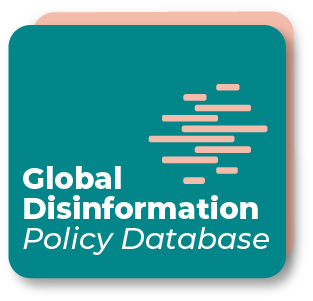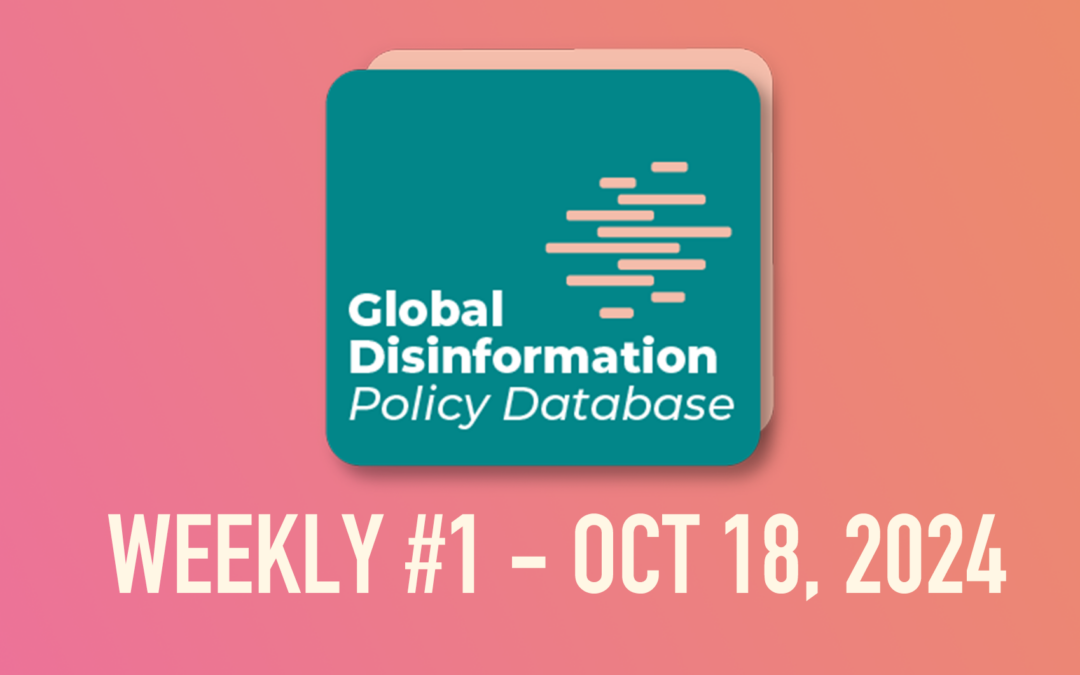Welcome to the first GDPD Weekly.
This series leverages the infrastructure we developed building the Global Disinformation Policy Database. Each week, we will scan the world for fresh developments in information disorder. Governments grapple with misinformation; citizens struggle to discern truth. Some actors weaponize these concerns. We want this series to be a resource for anyone interested in information disorder, information policy, or online trust and safety. In this edition: developments from over 29 countries.
Read along and let us know how we can improve. Your feedback will help shape this project moving forward.
Africa
- Libya is developing an online platform and code of conduct to counter misinformation for upcoming elections, involving civil society and government stakeholders. The group consisted of members of the high electoral commission, journalists, the ministry of the interior, and groups representing investigative journalists.
- Zimbabwe’s High Court issued a landmark defamation ruling. This article features quotes from election officials characterizing their growing concerns about AI-enabled disinformation.
- New scholarship published in the Journal of Disaster Risk Studies examines COVID-19 misinformation dynamics in South Africa.
- The Africa Facts Summit was held recently at the University of Ghana. The theme was “Combating Disinformation in the Age of Misinformation: Strategic Responses for Africa’s Information Ecosystem”. The event awarded several prizes for “fact check of the year”. Their winning entry, by Chiagozie Nwonwu & Fauziyya Tukur & Olaronke Alo addressed whether Bola Tinubu, the ruling party’s candidate for Nigeria’s 2023 presidential election, was eligible. (They found no evidence of him being ineligible)
- Ghana’s Electoral Commission has prepared educational videos to address election misinformation. Ghana’s 1992 Constitution entrusts the Election Commission to “educate the people on the electoral process and its purpose”. The commission is very active on social media, pre-bunking various election-related disinformation narratives.
- On October 25th, The Black Policy Institute is hosting a webinar discussion titled “Misinformation in Digital Africa: Lessons from Kenya and Nigeria,” featuring experts Toni Adewuyi, Silas Jonathan, Demas Kiprono, and Mikhail Nyamweya. The panel will explore how false narratives spread online, their societal impact, and actionable solutions in African digital spaces, with a focus on Kenya and Nigeria.
- The Niger State Government has partnered with Nigeria Health Watch to launch a health misinformation management fellowship.
Americas
- X (formerly Twitter) is back online in Brazil after the platform began complying with Supreme Court Justice Alexandre de Moraes’s disinformation-related demands. Check out Moderated Content for a fantastic overview of the issue.
- U.S. Senator Ben Cardin has urged Meta and Alphabet to address Russian disinformation in Moldova, highlighting the ways threat actors may be abusing the platforms.
- UNDP and the Ethnic Relations Commission of Guyana signed an MOU providing technical assistance to “strengthen ERC’s existing methodologies for mapping and countering disinformation and hate speech.”
- New scholarship explores the themes of Russian Disinformation in Ecuador
- Poynter investigated claims that Chinese and Russian threat actors amplified misinformation in the wake of hurricanes Helene and Milton.
Asia-Pacific
- The ASEAN-Australia Workshop in Jakarta focused on combating fake news, emphasizing regional collaboration and implementing the ASEAN Guideline on Management of Government Information in Combating Fake News and Disinformation in The Media
- Thailand’s Anti-Fake News Center has launched a new open data portal. (We think it’s new. We’ve never seen it before.)
- ISEAS – Yusof Ishak Institute (ISEAS) held a webinar on the role of Russian Disinformation in Vietnam called “Sputnik News and the Russian Disinformation Campaign in Vietnam”.
- Speaking of ISEAS… ISEAS researchers analyze the disinformation situation in Malaysia and put forward policy proposals (including media literacy and investing in AI-powered fact-checking tools).
- In India, the Internet Freedom Foundation has a new analysis up of a Madras High Court ruling. The Court found that not all misinformation sharing warrants legal action. They also develop some great analysis of the concept-definition problem that plagues many government responses to information disorder:
The lack of clear laws defining misinformation results in arbitrary arrests under laws like the Unlawful Activities (Prevention) (“UAPA”) Act, 1967, the Information Technology (“IT”) Act, 2000, and other criminal statutes.
Europe
- The EU presented a new sanctions framework that targets “individuals and entities that work with Russia to undermine the values, security, independence and integrity of the EU and its member states”
- CBS News recently reported on Finland’s comprehensive media literacy curriculum.
- Stefan Wolff of the University of Birmingham evaluates the information environment around Moldova’s upcoming vote on EU membership.
- Researchers tracked down the location for several of the domains behind ongoing disinformation campaigns. This NYT investigation centers on one building in Reykjavik.
- Ukraine’s Center for Countering Disinformation claimed that Russian intelligence services are planning a campaign to discredit military-technical cooperation between Ukraine and Turkey.
- The EU has called on Serbia to take urgent measures to combat Russian media manipulation and interference. EU spokesman for external affairs Peter Stano urged Serbia to do more.
- The European Digital Media Observatory reports on a case of disinformation targeting EU politician Michael Roth during his visit to Georgia.
- The development of a “Fake News” bill has been interrupted in Cyprus, as deliberation between lawmakers and media stakeholders continue.
Middle East
- The Ministry of Information in Kuwait referred 6 outlets for prosecution. The Ministry claims that the outlets published incorrect information about officer benefits and thus ran afoul of publication laws.
What did we miss? How can we improve this digest moving forward? We want to hear your feedback.

